-
 Bitcoin
Bitcoin $84,705.5206
1.96% -
 Ethereum
Ethereum $1,882.8342
2.59% -
 Tether USDt
Tether USDt $0.9999
-0.02% -
 XRP
XRP $2.1020
-0.02% -
 BNB
BNB $603.8511
-0.82% -
 Solana
Solana $124.7702
-1.25% -
 USDC
USDC $0.9999
-0.01% -
 Dogecoin
Dogecoin $0.1717
1.76% -
 Cardano
Cardano $0.6717
0.25% -
 TRON
TRON $0.2380
0.73% -
 Toncoin
Toncoin $3.9856
-3.94% -
 Chainlink
Chainlink $13.7866
0.95% -
 UNUS SED LEO
UNUS SED LEO $9.4087
2.25% -
 Stellar
Stellar $0.2691
1.18% -
 Avalanche
Avalanche $19.3533
1.55% -
 Sui
Sui $2.3689
0.72% -
 Shiba Inu
Shiba Inu $0.0...01244
-1.74% -
 Hedera
Hedera $0.1666
1.40% -
 Polkadot
Polkadot $4.1088
0.73% -
 Litecoin
Litecoin $83.2182
-0.74% -
 MANTRA
MANTRA $6.2222
-1.29% -
 Bitcoin Cash
Bitcoin Cash $306.0723
0.08% -
 Bitget Token
Bitget Token $4.6091
0.13% -
 Dai
Dai $1.0000
0.02% -
 Ethena USDe
Ethena USDe $0.9999
-0.01% -
 Pi
Pi $0.6919
-3.31% -
 Hyperliquid
Hyperliquid $13.1957
-3.08% -
 Monero
Monero $219.3099
1.05% -
 Uniswap
Uniswap $6.1691
2.09% -
 Pepe
Pepe $0.0...07614
3.60%
What fees do I have to pay to buy a Bitcoin ETF?
Bitcoin ETFs involve trading fees, expense ratios, and potential other charges; understanding these fees is crucial for maximizing returns.
Mar 27, 2025 at 04:49 pm
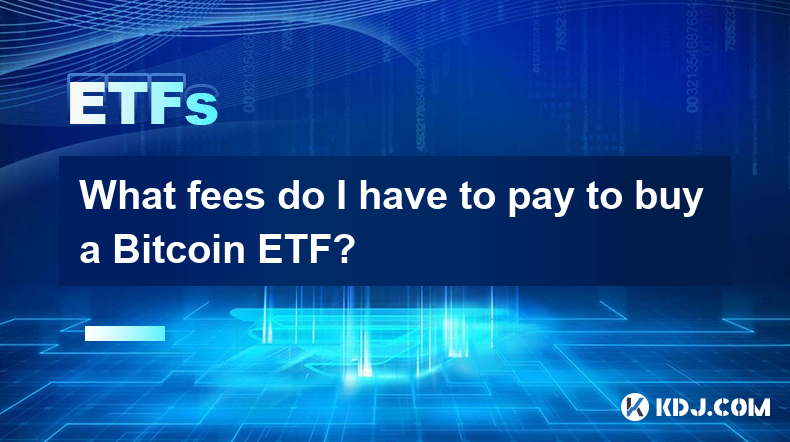
Understanding the Fee Structure of Bitcoin ETFs
Investing in a Bitcoin ETF, while offering exposure to Bitcoin without the complexities of directly holding it, involves various fees. These fees can be broadly categorized into trading fees, expense ratios, and potentially other miscellaneous charges depending on your brokerage. Understanding these fees is crucial for making informed investment decisions.
Trading Fees: These are charges levied by your brokerage for executing the buy and sell orders of the ETF shares. These fees can vary significantly depending on your brokerage, the trading platform used, and the volume of trades. Some brokerages offer commission-free trading, while others charge a fixed fee per trade or a percentage of the trade value. It's vital to compare brokerage fees before investing.
Expense Ratio: This is an annual fee charged by the ETF provider to cover the operational costs of managing the fund. The expense ratio is expressed as a percentage of your investment and is deducted continuously from the fund's assets. This means your returns are directly impacted by the expense ratio. Look for ETFs with competitive expense ratios. Lower expense ratios generally translate to higher returns over the long term.
Other Potential Fees: Besides trading fees and expense ratios, there might be other fees depending on your brokerage and the specific ETF. These could include account maintenance fees, inactivity fees, or transfer fees if you move your holdings between accounts. Always check the prospectus of the specific Bitcoin ETF you're considering to understand all applicable fees. Carefully review the prospectus before investing to avoid unexpected charges.
Breaking Down the Fee Components in Detail
Let's delve deeper into each fee category to get a clearer picture.
1. Brokerage Trading Fees: These fees are charged by your brokerage firm for executing your buy and sell orders. They're typically structured in one of several ways:
- Commission-based: A fixed fee per trade, regardless of the trade size.
- Percentage-based: A percentage of the total trade value.
- Tiered fees: Fees vary depending on the trading volume.
- Commission-free: Some brokerages offer commission-free trading for certain ETFs, but other fees might still apply.
Always inquire about any hidden fees or commissions with your brokerage.
2. ETF Expense Ratio: This represents the annual cost of managing the ETF. It's a crucial factor affecting your overall returns. The expense ratio is deducted from the fund's assets, impacting your investment's growth.
- The expense ratio is typically expressed as a percentage (e.g., 0.75%).
- A higher expense ratio means a larger portion of your investment goes towards covering the ETF's operational costs.
- Comparing expense ratios across different Bitcoin ETFs is essential for maximizing your returns.
3. Other Potential Fees (Brokerage Specific):
- Account Maintenance Fees: Some brokerages charge a monthly or annual fee for maintaining your investment account.
- Inactivity Fees: If your account remains inactive for a prolonged period, some brokerages may levy inactivity fees.
- Transfer Fees: Moving your ETF holdings between brokerages can incur transfer fees.
Minimizing Your Bitcoin ETF Fees
To minimize the fees associated with buying a Bitcoin ETF, consider the following strategies:
- Choose a Brokerage with Low Trading Fees or Commission-Free Trading: Many brokerages now offer commission-free trading for ETFs, significantly reducing your trading costs.
- Select ETFs with Low Expense Ratios: Compare expense ratios across different Bitcoin ETFs to find those with the lowest fees. Even a small difference in expense ratio can accumulate to a substantial amount over time.
- Understand All Fees Before Investing: Thoroughly review the prospectus of the specific ETF and your brokerage's fee schedule to avoid any surprises.
- Consider Your Trading Frequency: If you plan on frequent trading, the brokerage's trading fees will have a greater impact on your overall costs.
Frequently Asked Questions
Q: Are there any tax implications associated with buying and selling a Bitcoin ETF?
A: Yes, any profits from buying and selling a Bitcoin ETF are generally subject to capital gains taxes, which vary depending on your tax jurisdiction and holding period.
Q: How do I find the expense ratio of a Bitcoin ETF?
A: The expense ratio is typically listed in the ETF's prospectus or on the fund's fact sheet, often available on the ETF provider's website or your brokerage platform.
Q: Can I buy fractional shares of a Bitcoin ETF?
A: Most brokerages allow you to buy fractional shares of ETFs, making it easier to invest smaller amounts.
Q: What is the difference between a Bitcoin ETF and directly buying Bitcoin?
A: A Bitcoin ETF offers indirect exposure to Bitcoin through a regulated fund, while directly buying Bitcoin involves managing the cryptocurrency's private keys and navigating the complexities of cryptocurrency exchanges.
Q: Are Bitcoin ETFs regulated?
A: Bitcoin ETFs are subject to regulatory oversight, offering a degree of investor protection compared to directly holding Bitcoin. However, the regulatory landscape varies by jurisdiction.
Disclaimer:info@kdj.com
The information provided is not trading advice. kdj.com does not assume any responsibility for any investments made based on the information provided in this article. Cryptocurrencies are highly volatile and it is highly recommended that you invest with caution after thorough research!
If you believe that the content used on this website infringes your copyright, please contact us immediately (info@kdj.com) and we will delete it promptly.
- Santiment Released Data Offering Insights for Spotting Market Dips
- 2025-04-02 11:35:12
- Have You Ever Wondered What It Would Be Like to Invest in the Next Big Meme Coin Before It Skyrockets?
- 2025-04-02 11:35:12
- Circle, the company behind the USDC stablecoin, has filed for an initial public offering and plans to list its shares on the New York Stock Exchange
- 2025-04-02 11:30:12
- Circle, the company behind USDC stablecoin, has filed for an initial public offering and plans to list on the New York Stock Exchange
- 2025-04-02 11:30:12
- Circle, the company behind the USDC stablecoin, has filed for an initial public offering and plans to list on the New York Stock Exchange.
- 2025-04-02 11:25:12
- Hyperliquid's Centralized Twist Exposes the Paradox of Decentralized Finance
- 2025-04-02 11:25:12
Related knowledge
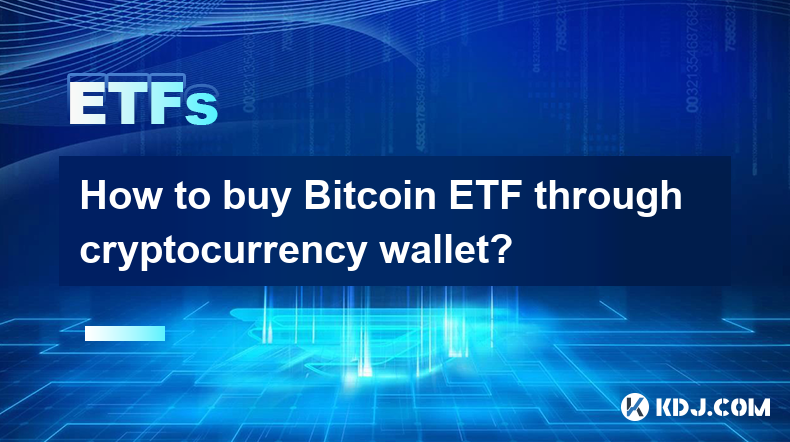
How to buy Bitcoin ETF through cryptocurrency wallet?
Mar 30,2025 at 08:22pm
It's important to understand that you cannot directly buy a Bitcoin ETF through a cryptocurrency wallet. Cryptocurrency wallets are designed to hold and manage digital assets like Bitcoin itself, not exchange-traded funds (ETFs). Bitcoin ETFs are traded on traditional stock exchanges, not decentralized cryptocurrency exchanges. Therefore, the process i...
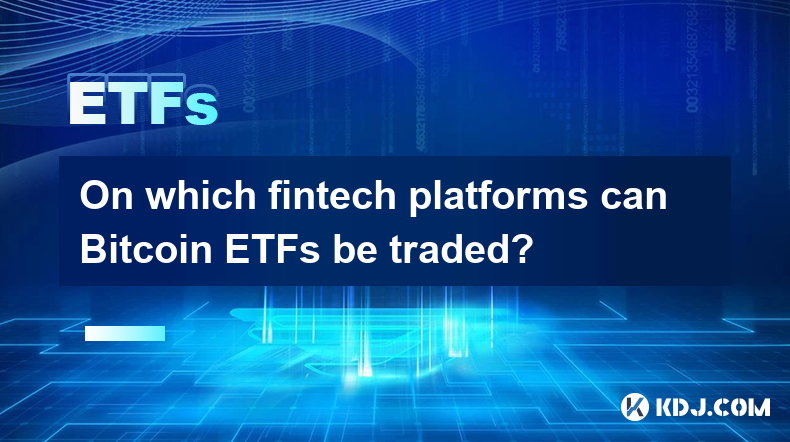
On which fintech platforms can Bitcoin ETFs be traded?
Mar 28,2025 at 09:21am
Navigating the Bitcoin ETF Landscape on Fintech PlatformsThe availability of Bitcoin ETFs on fintech platforms is a rapidly evolving landscape. Currently, the approval and subsequent listing of Bitcoin ETFs are subject to regulatory hurdles and vary significantly by jurisdiction. Therefore, the specific platforms offering Bitcoin ETF trading depend hea...
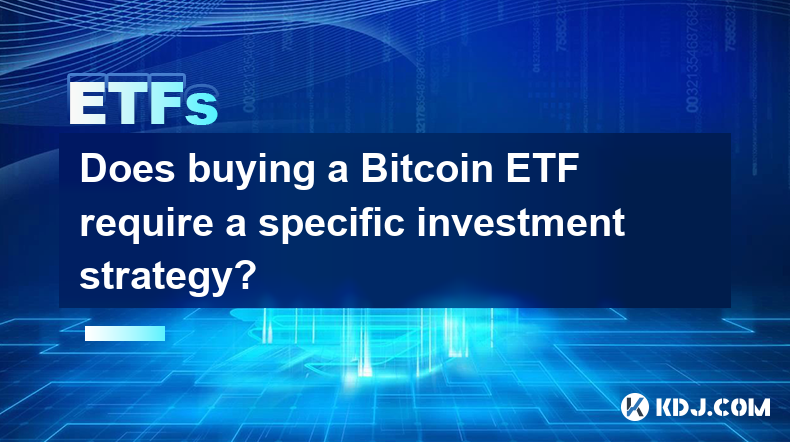
Does buying a Bitcoin ETF require a specific investment strategy?
Mar 27,2025 at 06:36pm
Understanding Bitcoin ETFs and Investment StrategiesA Bitcoin Exchange-Traded Fund (ETF) is a type of investment fund that tracks the price of Bitcoin. Investing in a Bitcoin ETF offers exposure to the cryptocurrency market without the complexities of directly owning and securing Bitcoin. However, like any investment, a successful strategy requires car...
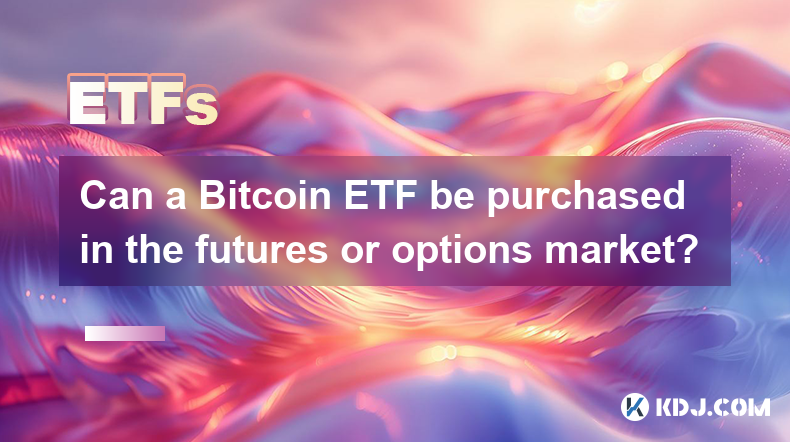
Can a Bitcoin ETF be purchased in the futures or options market?
Mar 27,2025 at 02:49am
Understanding Bitcoin ETFs and Derivative MarketsA Bitcoin ETF (Exchange-Traded Fund) is a fund that tracks the price of Bitcoin. Unlike directly buying Bitcoin, an ETF offers a more regulated and accessible way for investors to gain exposure to the cryptocurrency market through traditional brokerage accounts. However, the availability of a Bitcoin ETF...
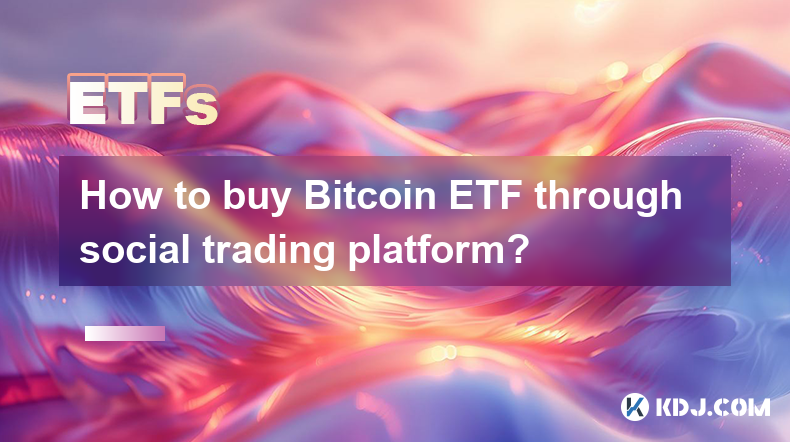
How to buy Bitcoin ETF through social trading platform?
Mar 27,2025 at 10:43am
How to Buy Bitcoin ETF Through Social Trading Platforms? Understanding Bitcoin ETFs and Social TradingA Bitcoin ETF (Exchange-Traded Fund) is a fund that tracks the price of Bitcoin. Unlike directly buying Bitcoin, an ETF offers a regulated and potentially less volatile way to gain exposure to the cryptocurrency market. This is because ETFs are traded o...
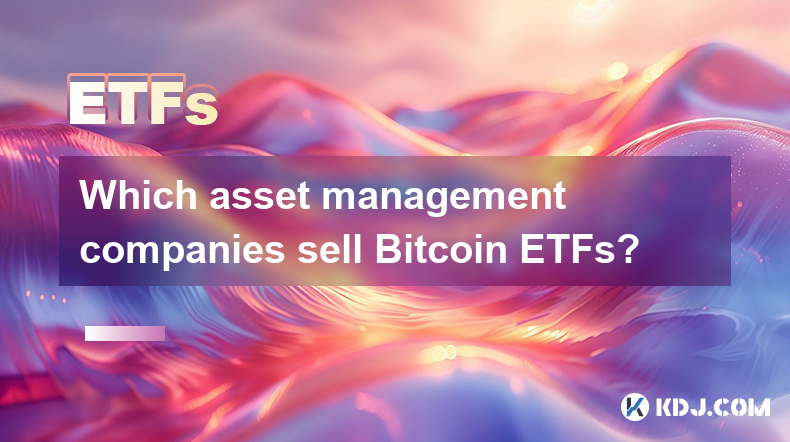
Which asset management companies sell Bitcoin ETFs?
Mar 28,2025 at 02:21am
The Current Landscape of Bitcoin ETF OfferingsCurrently, no asset management company offers a fully-fledged, SEC-approved Bitcoin ETF in the United States. While several companies have filed applications, the Securities and Exchange Commission (SEC) has yet to approve any. This is primarily due to concerns surrounding market manipulation, investor prot...

How to buy Bitcoin ETF through cryptocurrency wallet?
Mar 30,2025 at 08:22pm
It's important to understand that you cannot directly buy a Bitcoin ETF through a cryptocurrency wallet. Cryptocurrency wallets are designed to hold and manage digital assets like Bitcoin itself, not exchange-traded funds (ETFs). Bitcoin ETFs are traded on traditional stock exchanges, not decentralized cryptocurrency exchanges. Therefore, the process i...

On which fintech platforms can Bitcoin ETFs be traded?
Mar 28,2025 at 09:21am
Navigating the Bitcoin ETF Landscape on Fintech PlatformsThe availability of Bitcoin ETFs on fintech platforms is a rapidly evolving landscape. Currently, the approval and subsequent listing of Bitcoin ETFs are subject to regulatory hurdles and vary significantly by jurisdiction. Therefore, the specific platforms offering Bitcoin ETF trading depend hea...

Does buying a Bitcoin ETF require a specific investment strategy?
Mar 27,2025 at 06:36pm
Understanding Bitcoin ETFs and Investment StrategiesA Bitcoin Exchange-Traded Fund (ETF) is a type of investment fund that tracks the price of Bitcoin. Investing in a Bitcoin ETF offers exposure to the cryptocurrency market without the complexities of directly owning and securing Bitcoin. However, like any investment, a successful strategy requires car...

Can a Bitcoin ETF be purchased in the futures or options market?
Mar 27,2025 at 02:49am
Understanding Bitcoin ETFs and Derivative MarketsA Bitcoin ETF (Exchange-Traded Fund) is a fund that tracks the price of Bitcoin. Unlike directly buying Bitcoin, an ETF offers a more regulated and accessible way for investors to gain exposure to the cryptocurrency market through traditional brokerage accounts. However, the availability of a Bitcoin ETF...

How to buy Bitcoin ETF through social trading platform?
Mar 27,2025 at 10:43am
How to Buy Bitcoin ETF Through Social Trading Platforms? Understanding Bitcoin ETFs and Social TradingA Bitcoin ETF (Exchange-Traded Fund) is a fund that tracks the price of Bitcoin. Unlike directly buying Bitcoin, an ETF offers a regulated and potentially less volatile way to gain exposure to the cryptocurrency market. This is because ETFs are traded o...

Which asset management companies sell Bitcoin ETFs?
Mar 28,2025 at 02:21am
The Current Landscape of Bitcoin ETF OfferingsCurrently, no asset management company offers a fully-fledged, SEC-approved Bitcoin ETF in the United States. While several companies have filed applications, the Securities and Exchange Commission (SEC) has yet to approve any. This is primarily due to concerns surrounding market manipulation, investor prot...
See all articles






















































































